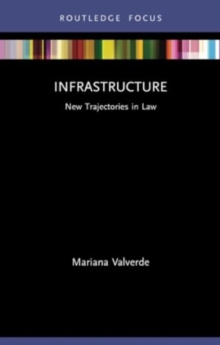Description
| Product ID: | 9781003254980 |
| Product Form: | Paperback / softback |
| Country of Manufacture: | GB |
| Series: | New Trajectories in Law |
| Title: | Infrastructure |
| Subtitle: | New Trajectories in Law |
| Authors: | Author: Mariana Valverde |
| Page Count: | 124 |
| Subjects: | Development studies, Development studies, Social and ethical issues, Urban communities, Sociology, Politics and government, Indigenous people: governance and politics, Economics, Public finance accounting, Jurisprudence and general issues, Company, commercial and competition law: general, Commercial law, Contract law, Construction and engineering law, Constitutional and administrative law: general, Military and defence law and civilian service law, Local government law, Criminal law: offences against the government, Planning law, Housing law, Social law and Medical law, Human geography, The environment, Urban and municipal planning and policy, Social issues & processes, Urban communities, Sociology, Politics & government, Regional government, Economics, Public finance accounting, Jurisprudence & general issues, Company, commercial & competition law, Commercial law, Contract law, Construction & engineering law, Constitutional & administrative law, Military & defence law, Local government law, Offences against the government, Planning law, Housing law, Social law, Human geography, The environment, Urban & municipal planning, USA |
| Description: | Select Guide Rating This book provides an overview and assessment of infrastucture’s legal and governance underpinnings. This book provides an overview and assessment of infrastructure’s legal and governance underpinnings. Infrastructure is often thought of as a term referring only to the physical entities – pipes, cables, utility poles, highways, airports – that facilitate the transmission of water, gas, telecommunications and electricity, as well as enabling both private and public transportation, and serving to house more or less public services such as health care and schools. However, infrastructure planning and implementation are not reducible to bricks and mortar. The complex process requires drawing from and sometimes re-inventing or recycling legal tools, from construction contracts to financing ‘deals’, which are often taken for granted by both practitioners and urban studies scholars. These are as important today as they were when the first railway lines were built, and to a large extent they remain just as invisible: the avalanche of drawings and photographs of planned or in-process fancy buildings tends to hide from view the behind- the-scenes negotiations and decision-making that had to happen before construction could start, and which in some cases continue afterwards. This book does not ignore the material and nonhuman aspects of infrastructure. But, focusing on the legal and governance underpinnings of infrastructure projects, via a series of key terms that refer to hybrid legal processes, the book offers an important socio-legal supplement to the current ‘infrastructure turn’. This book will be of interest to students in the areas of socio-legal studies, urban sociology, urban studies, urban geography, planning, public law, and contract law, as well as practitioners involved in infrastructure projects. |
| Imprint Name: | Routledge |
| Publisher Name: | Taylor & Francis Ltd |
| Country of Publication: | GB |
| Publishing Date: | 2024-01-29 |


